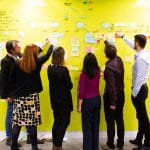Reflections on the UCL Citizen Science Community Event
By Kirsty, on 11 December 2024
Post provided by Sheetal Saujani, Citizen Science Support Officer.

This week’s UCL Citizen Science Community Event brought researchers, academics, students and staff from across UCL together to celebrate citizen science and participatory research. The slides and programme are available online so that everyone can follow up with the references.
The morning was packed with engaging talks and workshops, highlighting unique perspectives and approaches to citizen science. From discussions about an innovative mapping tool and the role of the UCL Urban Room in preserving local memories to hands-on workshops that sparked new ideas, the event demonstrated the diversity and potential of citizen-led research. One highlight was seeing the genuine passion from the presenters, whose enthusiasm was contagious.
At the start of the event, the Citizen Science team at the Office for Science and Scholarship and the UCL Co-Production and Public Engagement teams showcased their services and support including training, resources and advice. Their dedication to supporting citizen science and public engagement left everyone excited and ready to get involved. Both teams are eager to hear from the UCL community about their projects and the support they may need, so they encourage everyone to get in touch.
We also heard from Marcos Moreu and Fabien Moustard from the Extreme Citizen Science Research Group (ExCites) about a new tool called Kapta that they have been involved in the design for, allowing mapping data to be collected simply using WhatsApp, allowing small or remote communities to collect data without extensive knowledge or additional training. More information can be found by looking at the slides above or on Kapta.earth.
Professor Muki Haklay delved into the topic of skills and competencies in citizen science, exploring how competency frameworks define the skills, knowledge, and values needed for success in this field. His talk highlighted frameworks like the UCL Academic Careers Framework, Vitae’s Researcher Development Framework, and ECS Academy’s Research Competencies framework, which outline progression paths, accreditation standards, and expectations at foundational to expert levels. These frameworks not only codify what individuals need to know but also guide learning, recruitment, and career development. A live Mentimeter poll engaged attendees, inviting their perspectives on key skills, competencies and areas for development, sparking conversations about advancing expertise in citizen science.
 Dr Izzy Bishop led an interactive session where participants contributed their thoughts on the various elements required to include citizen science in a project proposal. The flipchart became a dynamic map, highlighting key areas such as co-design, engagement, training, communications, technology, volunteer management, data analysis, and impact. Each participant helped to identify UCL’s expertise and interest in these areas, promoting collaboration and a shared understanding.
Dr Izzy Bishop led an interactive session where participants contributed their thoughts on the various elements required to include citizen science in a project proposal. The flipchart became a dynamic map, highlighting key areas such as co-design, engagement, training, communications, technology, volunteer management, data analysis, and impact. Each participant helped to identify UCL’s expertise and interest in these areas, promoting collaboration and a shared understanding.
We also discussed strategies for applying for and sustaining project funding, with a focus on Horizon Europe opportunities. Professor Muki Haklay provided valuable insights on successfully navigating the application process and securing support for citizen science initiatives.
Hearing Jo Baines discuss UCL’s Urban Room, and the innovative Memory Workshop was truly inspiring. These projects showcase the power of engaging communities, including underrepresented groups, to explore shared histories and reimagine urban spaces. The Memory Workshop and Memory Bike demonstrate citizen science in action, amplifying diverse voices, and uncovering new insights through creative, participatory research. By equipping participants with skills and tools that extend beyond the projects, they highlight how citizen science connects people and ideas to drive meaningful change.
We were captivated by voices from two remarkable projects Flotilla by Melanie Manchot and Breaking Waves, which highlight the power of art and storytelling to link communities and preserve collective memory. Both reflect the spirit of citizen science by fostering connections and inspiring new perspectives. The links to experience these projects for yourself are available in the slides linked above.
Before the event closed, there was a fun and relaxed speed networking session. The vibrant spirit of session encouraged meaningful conversations and connections, reminding us of the value of sharing knowledge and experiences across disciplines and communities!
A huge thank you to all the speakers, workshop leaders, and participants who made the event so worthwhile. We hope everyone left as inspired as we did to continue championing citizen science!
Research Support Advent Calendar 2024
By Kirsty, on 29 November 2024
This year we are pleased to share our Advent Calendar of Research Support with you!
We will be posting links every day on our Bluesky account. If you’re not on Bluesky yet, don’t worry — we’ve shared the calendar below for you to view at your own time. We will also keep this post updated throughout the month with an accessible version of the content.
 1 December: On the first day of advent, improve the visibility of your research by updating your UCL public profile, recently revamped with key fields in RPS, including the new UN Sustainable Development Goals section, to align your research with global initiatives.
1 December: On the first day of advent, improve the visibility of your research by updating your UCL public profile, recently revamped with key fields in RPS, including the new UN Sustainable Development Goals section, to align your research with global initiatives.
https://www.ucl.ac.uk/library/open-science-research-support/ucl-profiles/getting-started-your-public-profile
- UCL front quad, looking towards Cruciform, an elegant red brick building. It is dark and the picture is lined with trees with purple and blue lights.
 2 December: Countdown to Christmas with Citizen Science…Join UCL’s first Citizen Science community event on 9 December! Let’s discover, share and network this season. Don’t forget to join our online network too! https://blogs.ucl.ac.uk/open-access/2024/11/13/get-involved-ucls-first-citizen-science-community-event-on-9-december-join-our-online-network/
2 December: Countdown to Christmas with Citizen Science…Join UCL’s first Citizen Science community event on 9 December! Let’s discover, share and network this season. Don’t forget to join our online network too! https://blogs.ucl.ac.uk/open-access/2024/11/13/get-involved-ucls-first-citizen-science-community-event-on-9-december-join-our-online-network/
- Image by Alejandro Salinas Lopez “alperucho” on UCL imagestore. A group of three women in warm clothing toasting with cups of coffee at night.
 3 December: Is Santa’s Christmas naughty or nice list copyrighted? Think of it as research data…Take our Christmas copyright quiz to learn more! https://ucl-global.libwizard.com/f/copyright_Christmas_quiz Image created using Copilot on 22 November
3 December: Is Santa’s Christmas naughty or nice list copyrighted? Think of it as research data…Take our Christmas copyright quiz to learn more! https://ucl-global.libwizard.com/f/copyright_Christmas_quiz Image created using Copilot on 22 November
- Image: cartoon of a copyright symbol with a white beard and Christmas hat.
 4 December: Today we are celebrating the 10 years since the IOE’s merger with UCL. Check out the action on the UCL Press channels.
4 December: Today we are celebrating the 10 years since the IOE’s merger with UCL. Check out the action on the UCL Press channels.
- Image from UCL Press. A perspective shot of the IOE looking up, looks like a stack of big concrete blocks.
 5 December: Learn how to connect your ORCID to UCL’s Research Publications Service (RPS) for up-to-date records and easier #OpenAccess compliance. More info: https://buff.ly/3WALW3s
5 December: Learn how to connect your ORCID to UCL’s Research Publications Service (RPS) for up-to-date records and easier #OpenAccess compliance. More info: https://buff.ly/3WALW3s
- Image by Mary Hinkley on UCL imagestore. UCL front quad at twilight. In front of the portico is a Christmas tree decorated with yellow lights. To the right of the image is a leafless tree decorated with purple and pink lights which can be seen reflecting off the white building beyond.
 6 December: Tis the season…for data management planning!
6 December: Tis the season…for data management planning!
https://www.ucl.ac.uk/library/open-science-research-support/research-data-management/policies/managing-data-across-research
- Image by Alejandro Salinas Lopez “alperucho” on UCL imagestore. Image shows a Christmas garland over and arch with people walking through, slightly out of focus. The garland is threaded with yellow lights and the words Happy Holiday Season are written in pink lights.
 7 December: Ever wondered if your publications are being cited in policy documents, and where? With policy and grey literature databases like Overton, you can discover who is citing your work and how it’s influencing decision-making documents. https://library-guides.ucl.ac.uk/research-metrics/overton
7 December: Ever wondered if your publications are being cited in policy documents, and where? With policy and grey literature databases like Overton, you can discover who is citing your work and how it’s influencing decision-making documents. https://library-guides.ucl.ac.uk/research-metrics/overton
- Image by Mat Wright on UCL imagestore. A girl with dark hair and wire rimmed glasses wearing a yellow jumper sits at a laptop. In the background can be seen colourful book stacks.
 8 December: Explore this year’s Open Science Conference collections available on UCL’s Media Central and Research Data Repository! Access talks, posters, and insights from UCL researchers advancing open science, and share in the wealth of knowledge supporting our open research community.
8 December: Explore this year’s Open Science Conference collections available on UCL’s Media Central and Research Data Repository! Access talks, posters, and insights from UCL researchers advancing open science, and share in the wealth of knowledge supporting our open research community.
https://blogs.ucl.ac.uk/open-access/2024/07/11/from-policy-to-practice-ucl-open-science-conference-2024/
- Image by John Moloney on UCL imagestore. A group of people in business attire socialising with drinks. Picture is taken from a distance and slightly above.
 9 December: Early Christmas Present?.. Yes please! Learn more about archiving your research outputs using the UCL Research Data Repository: https://www.ucl.ac.uk/library/open-science-research-support/research-data-management/ucl-research-data-repository
9 December: Early Christmas Present?.. Yes please! Learn more about archiving your research outputs using the UCL Research Data Repository: https://www.ucl.ac.uk/library/open-science-research-support/research-data-management/ucl-research-data-repository
- Image by UCL Media Services on UCL imagestore. A close up of a bright purple bauble on a tree with some blue lights.
 10 December: What did the copyright support team bring you this year? Read our Christmas blog!
10 December: What did the copyright support team bring you this year? Read our Christmas blog!
https://blogs.ucl.ac.uk/copyright/2024/12/02/the-twelve-gifts-of-copyright/
- Image by Tony Slade from UCL imagestore. A top-down photograph of four students working individually at wooden desks. To the right of the image are wooden bookcases full of colourful books.
 11 December: It’s UK Disability History Month (14 Nov – 20 Dec)! Take this opportunity to learn about the UCL Digital Accessibility team’s work to make research and resources more inclusive. Catch up on our profile with Ben Watson, leading the way on digital accessibility at UCL!
11 December: It’s UK Disability History Month (14 Nov – 20 Dec)! Take this opportunity to learn about the UCL Digital Accessibility team’s work to make research and resources more inclusive. Catch up on our profile with Ben Watson, leading the way on digital accessibility at UCL!
https://blogs.ucl.ac.uk/open-access/2024/07/08/spotlight-on-ben-watson-champion-of-digital-accessibility-at-ucl/
 12 December: Preprints as a way to share your initial findings to influence decision-makers: https://blogs.ucl.ac.uk/open-access/2020/11/06/case-study-disseminating-early-research-findings-to-influnce-decision-makers/
12 December: Preprints as a way to share your initial findings to influence decision-makers: https://blogs.ucl.ac.uk/open-access/2020/11/06/case-study-disseminating-early-research-findings-to-influnce-decision-makers/
- Image by Tony Slade on UCL imagestore. A close-up perspective shot of a bookcase. Black books with gold writing are in the foreground and red, orange and blue volumes are further back.
 13 December: Want to learn how UCL Press is committed to providing free, high-quality educational resources to support students and educators globally? Read Dhara Snowden’s blog on how #OpenAccess textbooks are reshaping the future of learning and education! https://blogs.ucl.ac.uk/open-access/2024/10/23/oa-textbooks-ucl-press-perspective/
13 December: Want to learn how UCL Press is committed to providing free, high-quality educational resources to support students and educators globally? Read Dhara Snowden’s blog on how #OpenAccess textbooks are reshaping the future of learning and education! https://blogs.ucl.ac.uk/open-access/2024/10/23/oa-textbooks-ucl-press-perspective/
- Image by Alejandro Salinas Lopez “alperucho” on UCL imagestore. A plate of mince pies.
 14 December: This holiday season, we’re celebrating meaningful partnerships between researchers and the public with the Principles for Citizen Science at UCL. The principles ensure that projects involving citizen scientists are inclusive, ethical, and impactful – a perfect recipe for success!
14 December: This holiday season, we’re celebrating meaningful partnerships between researchers and the public with the Principles for Citizen Science at UCL. The principles ensure that projects involving citizen scientists are inclusive, ethical, and impactful – a perfect recipe for success!
- Image by Mary Hinkley on UCL imagestore. A close up of a Christmas tree covered in yellow lights and small silver leaves. In the background can be seen a grey building, some leafless trees and a dark grey statue of a man.
 15 December: An RDM film recommendation – Coded Bias (Netflix)- When MIT Media Lab researcher Joy Buolamwini discovers that many facial recognition technologies misclassify women and darker-skinned faces, she delves into an investigation of widespread bias in algorithms. https://youtu.be/_84k600_6bg?feature=shared
15 December: An RDM film recommendation – Coded Bias (Netflix)- When MIT Media Lab researcher Joy Buolamwini discovers that many facial recognition technologies misclassify women and darker-skinned faces, she delves into an investigation of widespread bias in algorithms. https://youtu.be/_84k600_6bg?feature=shared
- Image by Alejandro Salinas Lopez “alperucho” on UCL imagestore. An arm and hand in profile holds up a mobile phone with the camera open. The phone shows the UCL portico and Christmas tree. The background is out of focus but appears to show Christmas lights.
 16 December: Creative Commons licences embrace the spirit of Christmas. Learn how they work: https://blogs.ucl.ac.uk/open-access/2023/10/23/how-creative-commons-licences-support-open-scholarship/
16 December: Creative Commons licences embrace the spirit of Christmas. Learn how they work: https://blogs.ucl.ac.uk/open-access/2023/10/23/how-creative-commons-licences-support-open-scholarship/
- Image by James Tye on UCL imagestore. Image shows a view through a gap in books to a woman with light brown hair holding the books open and appearing to be searching the shelf.
 17 December: Earlier this year, we introduced the UCL Statement on Principles of Authorship, created through community consultation and co-creation. This document is designed to promote more equitable and transparent authorship practices across UCL. Learn more: https://blogs.ucl.ac.uk/open-access/2024/10/25/announcing-ucl-statement-on-principles-of-authorship/
17 December: Earlier this year, we introduced the UCL Statement on Principles of Authorship, created through community consultation and co-creation. This document is designed to promote more equitable and transparent authorship practices across UCL. Learn more: https://blogs.ucl.ac.uk/open-access/2024/10/25/announcing-ucl-statement-on-principles-of-authorship/
- Image by Alejandro Walter Salinas Lopez on UCL imagestore. Six people in office attire facing a bright yellow wall covered in postit notes
 18 December: Have you ever questioned which university ranks highest for collaboration or open access? Explore the Leiden University Rankings, based exclusively on publication data, to find the answer. https://www.leidenranking.com/ranking/2024/list
18 December: Have you ever questioned which university ranks highest for collaboration or open access? Explore the Leiden University Rankings, based exclusively on publication data, to find the answer. https://www.leidenranking.com/ranking/2024/list
- Image by Mat Wright on UCL imagestore. A student with long blonde hair studies in the foreground. Behind her are rows of wooden desks and book stacks in arches sit further back.
 19 December: UCL Press Play: Check out the new podcast series from @uclpress.bsky.social hosted by Philip Schofield (UCL’s Bentham Project). Join UCL experts as they explore Jeremy Bentham’s legacy, covering utilitarianism, queer aesthetics, historical views on non-binary diversity, and more. Listen now: shorturl.at/Nvqzl
19 December: UCL Press Play: Check out the new podcast series from @uclpress.bsky.social hosted by Philip Schofield (UCL’s Bentham Project). Join UCL experts as they explore Jeremy Bentham’s legacy, covering utilitarianism, queer aesthetics, historical views on non-binary diversity, and more. Listen now: shorturl.at/Nvqzl
- Image by KamranAydinov on Freepik. Blue headphones surrounded by christmas decorations, stockings, candles, tree lights and pine cones.
 20 December: Ever hit a paywall when trying to access scholarly publications? Get the popcorn ready, and be prepared to have your eyes opened by watching this documentary ‘Paywall: the Business of Scholarship’ at https://paywallthemovie.com/ #OpenAccess #ResearchSupportAdvent
20 December: Ever hit a paywall when trying to access scholarly publications? Get the popcorn ready, and be prepared to have your eyes opened by watching this documentary ‘Paywall: the Business of Scholarship’ at https://paywallthemovie.com/ #OpenAccess #ResearchSupportAdvent
- Image by Mary Hinkley on UCL imagestore. A mixed group of people around a table working at laptops.
 21 December: An RDM stocking filler – Research Data MANTRA training – up your RDM skills with this external online course: https://mantra.ed.ac.uk/
21 December: An RDM stocking filler – Research Data MANTRA training – up your RDM skills with this external online course: https://mantra.ed.ac.uk/
- Image by Mary Hinkley on UCL imagestore. Two large and several small icicles against a wintery sky.
 22 December: UCL staff and students: join our new Copyright Literacy Community on Teams!
22 December: UCL staff and students: join our new Copyright Literacy Community on Teams!
- Image by KamranAydinov on Freepik. Top view of hand holding a pen on spiral notebook with new year writing and drawings decoration accessories on black background.
 23 December: Interested in discovering which UCL department or faculty collaborates most with yours, or identifying the most common research theme in your department? Explore the My Organisation data in InCites to uncover trends for your department or faculty. https://library-guides.ucl.ac.uk/web-of-science/incites
23 December: Interested in discovering which UCL department or faculty collaborates most with yours, or identifying the most common research theme in your department? Explore the My Organisation data in InCites to uncover trends for your department or faculty. https://library-guides.ucl.ac.uk/web-of-science/incites
- Image by Alejandro Salinas Lopez “alperucho” on UCL imagestore. A Christmas tree with white lights at night in front of columns lit with colours of the rainbow.
 24 December: From all the team here at the UCL Office for Open Science & Scholarship we want to thank you all for your collaboration and interaction this year, and wish you all a great break! We’ll be back after 6th January!
24 December: From all the team here at the UCL Office for Open Science & Scholarship we want to thank you all for your collaboration and interaction this year, and wish you all a great break! We’ll be back after 6th January!
- UCL portico in the background lit up in white at twilight. In the foreground and to either side trees are lit in a variety of rainbow colours.
Ethics of Open Science: Privacy risks and opportunities
By Kirsty, on 22 November 2024
Guest post by Ilan Kelman, Professor of Disasters and Health, building on his captivating presentation in Session 2 of the UCL Open Science Conference 2024.
Open Science brings risks and opportunities regarding privacy. Making methods, data, analyses, disagreements, and conclusions entirely publicly available demonstrates the scientific process, including its messiness and uncertainties. Showing how much we do not know and how we aim to fill in gaps excites and encourages people about science and scientific careers. It also holds scientists accountable, since any mistakes can be identified and corrected, which is always an essential part of science.
Given these advantages, Open Science offers so much to researchers and to those outside research. It helps to make science accessible to anyone, notably for application, while supporting exchange with those inspired by the work.
People’s right to privacy, as an ethical and legal mandate, must still be maintained. If a situation might worsen by Open Science not respecting privacy, irrespective of it being legal, then care is required to respect those who would want or might deserve privacy. Anonymity and confidentiality are part of research ethics precisely to achieve a balance. Irrespective, Open Science might inadvertently reveal information sources or it could be feasible to identify research participants who would prefer not to be exposed. Being aware of possible pitfalls assists in preventing them.
Disaster decisions
Some research could be seen as violating privacy. Disaster researchers seek to understand who dies in disasters, how, and why, in order to improve safety for everyone and to save lives. The work can examine death certificates and pictures of dead bodies. Publicising all this material could violate the privacy and dignity of those who perished and could augment the grief of those left behind.
Sometimes, research hones in on problematic actions for improving without blaming, whereas society more widely might seek to judge. A handful of studies has examined the blood alcohol level of drivers who died while driving through floodwater, which should never be attempted even when sober (Figure 1). In many cases, the driver was above the legal limit for blood alcohol level. Rather than embarrassing the deceased by naming-and-shaming, it would help everyone to use the data as an impetus to tackle simultaneously the separate and unacceptable decisions to drive drunk, to drive drugged, and to drive through floodwater.
Yet storytelling can be a powerful communication technique to encourage positive behavioural change. If identifying details are used, then it must involve the individuals’ or their kin’s full and informed consent. Even with this consent, it might not be necessary to provide the full details, as a more generic narrative can remain emotional and effective. Opportunities for improving disaster decisions emerge in consensual sharing, so that it avoids violating privacy—while also being careful regarding the real need to publish the specifics of any particular story.

Figure 1: Researching the dangerous behaviour of people driving through floodwater, with the number plate blurred to protect privacy (photo by Ilan Kelman).
Small sample populations
Maintaining confidentiality and anonymity for interviewees can be a struggle where interviewees have comparatively unique experiences or positions and so are easily identifiable. Governments in jurisdictions with smaller populations might employ only a handful of people in the entire country who know about a certain topic. Stating that an interviewee is “A national government worker in Eswatini specialising in international environmental treaties” or “A megacity mayor” could narrow it down to a few people or to one person.
A similar situation arises with groups comprising a small number of people from whom to select interviewees, such as “vehicle business owners in Kiruna, Sweden”, “International NGO CEOs”, or specific elites. Even with thousands of possible interviewees, for instance “university chiefs” or “Olympic athletes”, quotations from the interview or locational details might make it easy to narrow down and single out a specific interviewee.
Interviewee identification can become even simpler when basic data on interviewees, such as sex and age range, are provided, as is standard in research papers. Providing interview data in a public repository is sometimes expected, with the possibility of full transcripts, so that others can examine and use those data. The way someone expresses themselves might make them straightforward to pinpoint within a small group of potential interviewees.
Again, risks and opportunities regarding privacy focus on consent and on necessity of listing details. Everyone including any public figure has some level of a right to privacy (Figure 2). Where consent is not given to waive confidentiality or anonymity, then the research process—including reviewing and publishing academic papers—needs to accept that not all interviewee details or data can or should be shared. With consent, care is still required to ensure that identifying individuals or permitting them to be discovered really adds to the positive impacts from the research.

Figure 2: Ralph Nader, an American politician and activist, still has a right to privacy when not speaking in public (photo by Ilan Kelman).
Caution, care, and balance
With caution and care, always seeking a balance with respect to privacy, any difficulties emerging from Open Science can be prevented. Of especial importance is not sacrificing many of the immense and much-needed gains from Open Science.
Get involved: UCL’s first Citizen Science Community event on 9 December + Join our online network!
By Rafael, on 13 November 2024
Post by Sheetal Saujani, UCL Citizen Science Coordinator.
Are you passionate about citizen science, or curious about how to involve the public in research projects? Join us on Monday, 9 December, from 10:00-13:00 at UCL’s IAS Common Ground (Room G11, South Wing, UCL Wilkins Building) for a half-day event that will bring together the Citizen Science community at UCL to learn, share, and connect!
 This event is a fantastic opportunity for UCL staff and students interested in Citizen Science —whether you’re already engaged in a project or just exploring the field. The event will feature inspiring lightning talks, two hands-on workshops, and a look into a standout citizen science initiative—the UCL Memory Workshop. You’ll gain insights into cutting-edge citizen science practices at UCL and beyond, as well as guidance on skills development, research funding, and collaborative projects.
This event is a fantastic opportunity for UCL staff and students interested in Citizen Science —whether you’re already engaged in a project or just exploring the field. The event will feature inspiring lightning talks, two hands-on workshops, and a look into a standout citizen science initiative—the UCL Memory Workshop. You’ll gain insights into cutting-edge citizen science practices at UCL and beyond, as well as guidance on skills development, research funding, and collaborative projects.
Our agenda includes:
- Lightning talks: Discover citizen science units, resources, and support across UCL.
- Skills development workshop: Led by Prof. Muki Haklay from UCL ExCiteS, this session will build core competencies in citizen science.
- Interactive workshop: Develop compelling grant applications for citizen science and map out UCL expertise in the field.
- Citizen science project highlight: An introduction to the UCL Memory Workshop, our showcase citizen science initiative.
- Speed networking session (optional): Meet others passionate about citizen science and grow your professional network.
This event is more than just a chance to learn: it’s designed to connect you with like-minded peers and foster collaborations across departments. Plus, with light refreshments provided, it’s the perfect way to spend a Monday morning in great company!
Please see the Eventbrite page for more information and book your place today!
Don’t miss out on the chance to grow, learn, and become part of a vibrant, diverse community. Register now and help shape the future of citizen science at UCL!
This event is for UCL staff and students only.
Get involved and join the Citizen Science MS Teams Community!
In October 2023, we launched the UCL Citizen Science community on MS Teams, and we want you to be part of it! Whether you’re a student, staff member, or researcher at UCL with a passion for or interest in citizen science, this informal network is your chance to connect and grow. Join a community where you can share knowledge and experiences, exchange ideas, advice, and stories that inspire. It’s more than just a platform—it’s a space for building networks, sparking creativity, and driving citizen science forward.
Become part of the online network today and help shape the future of citizen science!
Open educational resources and copyright: what do you need to consider?
By Rafael, on 7 November 2024
This is the last article of our Copyright and Open Science series by Christine Daoutis, UCL Copyright Support Officer, which explored important aspects of copyright and its implications for open research and scholarship.
In this post, we conclude our Copyright and Open Science series by focusing on open education. Broadly defined, open education is “a philosophy about how people should produce, share, and build on knowledge” (source: What is open education? Opensource.com). It refers to values, practices and resources that aim to make scholarship more accessible, equitable, sustainable, transparent and collaborative.
The UNESCO definition of OERs highlights the importance of freely accessible educational materials in advancing open education practices globally. This includes the creation and reuse of OERs—materials that are either out of copyright or licensed to allow reuse. However, open education extends beyond resources to include practices such as integrating open science into teaching, sharing educational practices, and co-creating resources with learners.
OERs include a wide range of materials, such as open textbooks, open access articles, lecture handouts, images, film, slides, lecture recordings, assessment resources, software and whole courses such as Massive Open Online Courses (MOOCS). By default, all these resources are protected by copyright. If you’re planning to create open educational resources, here’s some copyright advice.
Addressing copyright in OERs
1. Know who owns what. If you are creating or collaborating on a teaching resource, it is essential to clarify who holds the copyright. This could be you, the author; your employer, if the work was created in the course of employment; or the resource could be co-owned with others, including students or sponsors. To license a resource for reuse (for example, to make it available under a Creative Commons licence), you must own the copyright to the resource and/or agree such licensing with co-owners. ♦ Copyright ownership at UCL is addressed in the UCL IP Policy.
2. Make the resources openly available and reusable. Once you are certain that the resource is yours to license, consider making it openly available, under a licence that allows reuse. Open access repositories support the discovery and access of different types of materials, including OERs. UCL has a dedicated OER repository, which accepts materials created by its staff and students.
As for licensing: we have explained in a previous post how Creative Commons licences work; and you can read more on how CC licences support OERs on the Creative Commons wiki. Licensing under the most permissive of the licences, the Creative Commons Attribution licence (CC BY), supports the ‘five Rs’ of OERs: enabling others to “retain, revise, remix, reuse and redistribute the materials”. (David Wiley, Defining the “Open” in Open Content and Open Educational Resources, Improving Learning blog).
3. Address any third-party materials. If the resource contains materials you don’t own the copyright to (such as third-party content), you have a few options:
- Reuse works that are out of copyright (public domain) or openly licensed. These might include Creative Commons images and videos, open access articles, and OERs created by others. ♦ See UCL’s guidance on finding OERs and a reading list with links to many openly licensed resources.
- Get permission from the copyright owner. If the material is not openly licensed, you might consider seeking permission to reuse it. Be clear about how the resource containing the material will be shared (i.e., as an OER). Third-party materials included in an OER should be shared under their own copyright terms (e.g., their reuse may be more restricted than the rest of the resource) and this should be communicated when sharing.
- Rely on a copyright exception. In some cases, instead of getting permission you may decide to rely on a copyright exception, notably the quotation exception in UK copyright law. Using exceptions requires judgement. You’ll need to determine whether the use of the material is ‘fair dealing’: does the purpose justify the use? Does it affect the copyright owner’s market? Overall, is it “fair” to all parties involved? Be aware that copyright exceptions vary by country, which is important when making a resource globally available. The Code of Best Practices in Fair Use for Open Educational Resources explores these approaches further, putting forward a framework that could be applied internationally.
Putting the copyright advice to practice: examples from UCL’s copyright online tutorials.

Screenshot from UCL’s Copyright Essentials tutorial, which includes a photo by Michael Neel from Knoxville, TN, USA, CC BY 2.0, via Wikimedia Commons.
While creating UCL’s Copyright Essentials and Copyright and your Teaching, two online tutorials introducing copyright, the UCL Copyright support team drew on its own advice. Specifically:
- Copyright ownership and attribution were addressed. Copyright Essentials is an adaptation of an original resource, which was also openly licensed. Attribution to all original authors was included.
- Both tutorials are publicly available online, allowing anyone to access and complete them. They are also licensed for reuse under the Creative Commons Attribution licence, permitting others to adapt and redistribute the materials with appropriate attribution.
- Third-party materials mostly included openly licensed images and links to lawfully shared videos and documents. However, for some materials, we opted to rely on copyright exceptions, which involved a degree of interpretation and risk. This was highlighted in the tutorials, inviting learners to reflect on the use of exceptions.
It should be noted that using proprietary e-learning tools (like Articulate Rise) to develop the tutorials restricts reuse. While the shared resources can be accessed, they cannot be downloaded or edited. Authors wishing to adapt the resources have the option to recreate the materials under the licence terms or contact us for an editable copy. Ideally, these resources should be created with open-source tools, but there’s a trade-off between the advantages of user-friendly, accessible proprietary tools and these limitations.
For more advice on copyright and OERs please contact copyright@ucl.ac.uk.
Read more from the Copyright and Open Science Series:
- Developing a Copyright Literacy Community at UCL (UCL Copyright blog, 29 April 2024): An introduction to building a community around copyright literacy at UCL.
- Copyright Literacy Matters: Developing a Copyright Literacy Strategy at UCL (UCL Copyright blog, 14 October 2024): A deep dive into UCL’s strategy for copyright literacy across the institution.
- Keeping it Fair and Honest: How Copyright Exceptions Can Support Your Thesis, Publications, and Teaching (UCL Copyright blog, 22 February 2024): This post explores copyright exceptions, with practical examples for researchers and educators.
- Copyright and Open Science in the Age of AI: What Can We All Do to Ensure Free and Open Access to Knowledge for All? (Open@UCL blog, 24 October 2024): A discussion on the intersection of copyright, open science, and AI, focusing on access and equity.
- Copyright and AI Part 1: How Does Copyright Apply to AI-Generated Works? (Open@UCL blog, 21 June 2024): An exploration of the implications of AI in copyright law, particularly concerning AI-generated works.
- Copyright and AI Part 2: Perceived Challenges, Suggested Approaches, and the Role of Copyright Literacy (Open@UCL blog, 15 August 2024): A follow-up on the challenges AI presents to copyright, along with potential solutions and the role of copyright literacy in addressing these challenges.
- Text and Data Mining (TDM) and Your Research: Copyright Implications and New Website Guidance (Open@UCL blog, 13 May 2024): Insights into how copyright affects text and data mining (TDM) in research, including new guidance.
- How Understanding Copyright Can Help You as a Researcher (Open@UCL blog, 4 April 2024): A beginner’s guide to understanding copyright and its importance for academic research.
Celebrating Open Science & Scholarship: Highlights from the Second Annual Awards Ceremony!
By Rafael, on 1 November 2024
As part of our Open Access Week celebrations, we were delighted to host the second annual Open Science & Scholarship Awards presentation. This event gave us the opportunity to gather in person, congratulate the awardees, and celebrate their achievements after announcing the winners a few weeks ago.
The event began with certificate presentations, followed by a showcase of the award-winning projects.
 First, Enny van Beest and Célian Bimbard, who received an honourable mention in the Open Source Software/Analytical Tools category, shared their project UnitMatch. Designed to track neurons across extensive Neuropixel Recordings, this software accelerates the analysis of large datasets, proving a valuable resource for researchers handling high volumes of neural data.
First, Enny van Beest and Célian Bimbard, who received an honourable mention in the Open Source Software/Analytical Tools category, shared their project UnitMatch. Designed to track neurons across extensive Neuropixel Recordings, this software accelerates the analysis of large datasets, proving a valuable resource for researchers handling high volumes of neural data.
Next, winners of the Student category, Sophie Ka Ling Lau and Divya Balain, presented Diverse Voices, a website emerging from their project on the impact of COVID-19 on East London communities. Sophie and Divya, both Master’s students from UCL’s Departments of Brain Sciences and Life Sciences, respectively, created this collaborative platform to share insights gained from their research.
In the Advocating for Open Science & Community Building category, Joseph Cook shared his work with the UCL Citizen Science Academy, housed within the Institute for Global Prosperity. The Academy empowers citizens to participate in research projects, offering a structured learning programme and a certificate that recognises their contributions and learning.
The Professional Services Staff category award went to the Understanding Disability Project, presented by Eirini-Christina Saloniki and William Lammons. This project combines lived experiences with broad representation to document perspectives of people living with disabilities across North Thames, aiming for a comprehensive view that highlights the unique challenges they face.
Finally, in the Open Publishing category, Emily Gardner discussed her work with the NCL Mutation Database. This essential resource supports Batten Disease research and therapeutic development, with Emily’s work ensuring metadata accuracy and database reliability for researchers.
In the Open-Source Software category, we also recognised Alessandro Felder and the BrainGlobe Initiative, a collaborative project focused on creating open-access tools that support neuroscientific research worldwide. Although Alessandro couldn’t attend the ceremony, we were proud to recognise this initiative’s impressive accomplishments. Founded in 2020 to advance the handling and analysis of neuroimaging data, the BrainGlobe tools have been downloaded over 2.7 million times around the world!
After the presentations, the audience had a chance to network and enjoy refreshments provided by UCL Press, the event’s generous sponsor.
We would like to extend a special thank you to our other honorable mention recipients: Beth Downe, Gabrielle Pengyu Shao, Deborah Padfield, Dr. Adam Parker, Hengrui Zhang, Mathilde Ripart, Justyna Petke, Claire Waddington, and Fan Cheng. Representing a range of departments, teams, and centres across UCL – from the Slade School of Fine Art to the Dementia Research Centre – we were thrilled to celebrate your work and dedication to advancing open science across disciplines. Thank you for being part of this event!
 Our heartfelt thanks go to UCL Press for their support, the Office for Open Science & Scholarship team for organising the awards, and Sandy Schumann and Jessie Baldwin, UKRN local network leads, for managing the submission and peer review process. Special thanks go to Paul Ayris, Head of the UCL Office for Open Science & Scholarship, and David Shanks, UCL’s Institutional Lead for Reproducibility, for their continued support of these awards.
Our heartfelt thanks go to UCL Press for their support, the Office for Open Science & Scholarship team for organising the awards, and Sandy Schumann and Jessie Baldwin, UKRN local network leads, for managing the submission and peer review process. Special thanks go to Paul Ayris, Head of the UCL Office for Open Science & Scholarship, and David Shanks, UCL’s Institutional Lead for Reproducibility, for their continued support of these awards.
Watch this space for the next Open Science and Scholarship Awards!
Announcing: UCL Statement on Principles of Authorship
By Kirsty, on 25 October 2024
As we conclude International Open Access Week, we have been inspired by a wealth of discussions and events across UCL! This week, we have explored balancing collaboration and commercialisation, highlighted the work of Citizen Science initiatives, discussed the role of open access textbooks in education, and addressed key copyright challenges in the age of AI to ensure free and open access to knowledge.
Today, we are excited to introduce the UCL Statement of Principles of Authorship. This new document, shaped through a co-creation workshop and community consultation, provides guidance on equitable authorship practices and aims to foster more inclusive and transparent research collaboration across UCL.
The team at the UCL Office for Open Science & Scholarship is pleased to launch the UCL Statement of Principles of Authorship. These principles have been built up from a co-creation workshop and developed in consultation with our academic community and are now available for wider use, linked from our website.
In August 2023, the OOSS Team posted a discussion about the challenges of equity in authorship and the co-production workshop held during that year’s Open Science & Scholarship Conference. We outlined some preliminary considerations that led to the workshop, summarised the discussion and emerging themes, including the need to more widely acknowledge contributions to research outputs, the power dynamics involved in authorship decisions, and ways to make academic language and terminology accessible for contributors outside the academic ‘bubble’.
The outcomes of the workshop were then used as the basis for developing the new Statement of Principles of Authorship. This document provides general advice, recommendations and requirements for authors, designed to complement the UCL Code of Conduct for Research and align with existing published frameworks, such as the Technicians Commitment or CRediT. The document outlines four core principles and a variety of applications for their use across the broad range of subject areas and output types that are produced across the institution. It also proposes standards for affiliations and equitable representation of contributors.
While it is true that academic publishing is a complex and changing environment, these principles are intended as a touchstone for discussions around authorship rather than explicit expectations or policy. They can guide decision making, help understand how affiliations should be presented for best consistency and traceability in the long term, and empower people to request inclusion or make plans to include citizen scientists or other types of collaborators to their work.
We look forward to hearing the many ways that these principles can be used by the community!
For a full overview of our #OAWeek 2024 posts, visit our blog series page. To learn more about the Principles of Authorship and stay updated on open science initiatives across UCL, sign up for our mailing list.
Copyright and Open science in the age of AI: what can we all do to ensure free and open access to knowledge for all?
By Rafael, on 24 October 2024
We are approaching the end of International Open Access Week, and we have been enjoying a series of interesting insights and discussions across UCL! Earlier this week, we explored the balance between collaboration and commercialisation, highlighted the important work of Citizen Science initiatives and the growing significance of open access textbooks.
Today, Christine Daoutis, UCL Copyright Support Officer, will build on our ongoing series about copyright and open science, focusing on how we can ensure free and open access to knowledge in the age of AI, by addressing copyright challenges, advocating for rights retention policies, and discussing secondary publication rights that benefit both researchers and the public.
Open Access Week 2024 builds on last year’s theme, Community over Commercialisation, aiming not only to continue discussions but to take meaningful action that prioritises the interests of the scholarly community and the public. This post focuses on copyright-related issues that, when addressed by both individual researchers and through institutional, funder, and legal reforms, can help create more sustainable and equitable access to knowledge.

Rights retention infographic. Source: cOAlition-s
Retaining author rights
Broadly speaking, rights retention means that authors of scholarly publications avoid the traditional practice of signing away their rights to publishers, typically done through a copyright transfer agreement or exclusive licence. Instead, as an author, you retain at least some rights that allow you to share and reuse your own research as openly as possible. For example, you could post your work in an open access repository, share it on academic networks, reuse it in your teaching, and incorporate it into other works like your thesis.
Many funders and institutions have specific rights retention policies that address related legal issues. If such a policy applies, and publishers are informed in advance, authors typically need to retain rights and apply an open licence (usually CC BY) to the accepted manuscript at the point of submission.
Rights retention ensures that your research can be made open access without relying on unsustainable pay-to-publish models, and without facing delays or restrictions from publishers’ web posting policies. Importantly, rights retention is not limited to published research—it can be applied to preprints, data, protocols, and other outputs throughout the research process.
Secondary Publication Rights (SPRs)
Secondary publication rights (SPRs) refer to legislation that allows publicly funded research to be published in an open access repository or elsewhere, at the same time as its primary publication in academic journals. Some European countries already have SPRs, as highlighted by the Knowledge Rights 21 study conducted by LIBER, and LIBER advocates for #ZeroEmbargo on publicly funded scientific publications. There are ongoing calls to harmonise and optimise these rights across countries, ensuring that the version of record becomes immediately available upon publication, overriding contractual restrictions imposed by publishers.
SPRs can apply to different types of research output and are meant to complement rights retention policies. However, introducing SPRs depends on copyright reform, which is not an action individual researchers can take themselves, though it’s still useful to be aware of developments in this area.

Source: Computer17293866, CC BY-SA 4.0, via Wikimedia Commons
Artificial Intelligence and your rights
The rise of Generative AI (GenAI) has introduced broader issues affecting researchers, both as users and as authors of copyrighted works. These include:
- Clauses in subscription agreements that seek to prevent researchers from using resources their institution has subscribed to for AI-related purposes.
- Publishers forming agreements with AI companies to share content from journal articles and books for AI training purposes, often without clear communication to authors. A recent deal between Taylor & Francis and Microsoft for $10 million has raised concerns among scholars about how their research will be used by AI tools. In some cases, authors are given the option to opt in, as seen with Cambridge Press.
- For works already licensed for reuse, such as articles under a CC BY licence or those used under copyright exceptions, questions arise about how the work will be reused, for what purposes, and how it will be attributed.
While including published research in AI training should help improve the accuracy of models and reduce bias, researchers should have enough information to understand and decide how their work is reused. Creative Commons is exploring ‘preference signals’ for authors of CC-licensed works to address this issue.
The key issue is that transferring your copyright or exclusive rights to a publisher restricts what you can do with your own work and allows the publisher to reuse your work in ways beyond your control, including training AI models.
Using Copyright exceptions in research
UK copyright law includes exceptions (known as ‘permitted acts’) for non-commercial research, private study, criticism, review, quotation, and illustration for instruction. As a researcher, you can rely on these exceptions as long as your use qualifies as ‘fair dealing’, as previously discussed in a blog post during Fair Dealing Week. Text and data mining for non-commercial research is also covered by an exception, allowing researchers to download and analyse large amounts of data to which they have lawful access.
Relying on copyright exceptions involves evaluating your purpose and, for some exceptions, making a decision around what is ‘fair’. This also involves some assessment of risk. Understanding copyright exceptions helps you exercise your rights as users of knowledge and make confident assessments as to whether and when a copyright exception is likely to apply, and when permission is necessary. [see links for UK legislation at the end of this article]
Engage with copyright at UCL
The conversations sparked during Open Access Week continue throughout the year at UCL as part of ongoing copyright support and education. To engage further with these issues, you can:
- Add your voice to how copyright literacy is shaped at UCL. Provide feedback on the draft UCL copyright literacy strategy and consider joining the new UCL copyright literacy community.
- Attend a copyright training session or email copyright@ucl.ac.uk to arrange a bespoke session. The newly introduced ‘Copyright, Open Science and Creativity’ game is a fun way of engaging with current debates and learning about recent developments. More dates for this will be released soon.
- Follow copyright news on the Open@UCL blog and the Copyright blog.
Useful Legislation
- Copyright, Designs and Patents Act 1988, Section 29: Research and Private Study
- Copyright, Designs and Patents Act 1988, Section 29A: Text and Data Mining for Non-Commercial Research
- Copyright, Designs and Patents Act 1988, Section 30: Text and Data Mining
- Copyright, Designs and Patents Act 1988, Section 32: Copying for non-commercial research
OA Textbooks: UCL Press Perspective
By Rafael, on 23 October 2024
As we continue celebrating International Open Access Week, it’s inspiring to see how open access is shaping research and collaboration across UCL! Earlier this week, we explored the balance between collaboration and commercialisation, and highlighted the important work of Citizen Science initiatives.
Midway through the week, Dhara Snowden, Textbook Programme Manager at UCL Press, shares her insights below on the growing significance of open access textbooks and their role in the broader landscape of open access publishing.
UCL Press is the UK’s first, and largest, fully open access university press. We have been publishing books and journals for almost ten years, covering a wide range of subjects and formats. In 2021, the press launched a new programme focusing on open access (OA) textbooks. I joined at that time, and over the past three years, I’ve been responsible for managing our progress in this area. As part of this year’s International Open Access Week, I wanted to share some of our thinking and planning around this activity and offer some musings about OA textbook publishing in general and what the future holds.
What are Open Access Textbooks?
Firstly, it’s useful to clarify what we mean by “textbooks.” Through conversations with academics across faculties, I’ve realised this term can mean different things depending on the context and level of study. In the broadest sense, a textbook is a resource that supports the delivery of a course or module. Textbooks can provide a wide-view survey of a field or subject, to be “adopted” as the main guide for study, or they can be part of a reading list that includes chapters from various sources, like journal articles.
Although textbooks were traditionally published in print, there has been increasing demand for digital versions of commercial textbooks, which can be purchased by individuals and licenced to institutions for use for multiple users.
Open access publishing, meanwhile, involves making scholarly content freely available online, removing subscription or purchase barriers. In the context of textbooks, this means students and educators can access high-quality educational resources without significant costs. OA textbooks are typically published under a Creative Commons (CC) licence, which allows for redistribution, adaptation, and modification, promoting a collaborative and inclusive educational environment.
The creation and uptake of OA textbooks has seen a sharp increase in recent years, particularly in the US and UK, with non-profit-funded publishers like OpenStax, collaboratively funded projects like CORE Econ, and platforms like Pressbooks. The Open Textbook Library, supported by Open Education Network, currently indexes 1,542 published open textbooks.
Why do we create them?
The UCL Press textbook programme was set up in direct response to issues around pricing for institutional access to essential e-textbooks, which were exacerbated during the Covid-19 pandemic. The current ecosystem presents an unstable and unsustainable financial model for institutional libraries, as well documented by the eBooks SOS campaign, which calls attention to the lack of regulation in pricing by commercial publishers.
An article published by Insights in 2022, ‘Perspectives on e-books and digital textbooks and the way ahead’, claims that ‘combined spending on book across nationally negotiated library purchasing frameworks increased from £55M in 2019/20 to £73M in 202/21, with e-textbook provision increasing by 281% to £25.1M during that time’.
In addition to concerns about affordability and sustained access, the Insights article outlines that post-pandemic, “shifts in teaching practice are accelerating demand for features that enhance blended learning”, with more flexibility and adaptability in resources being required, which isn’t being delivered by traditional academic publishing.
UCL Press’s aims to disrupt the current academic publishing ecosystem, offering authors and readers an alternative to the commercial model. This connects the theme for OA Week 2024, which calls for community over commercialisation. Bringing publishing back to the hands of academy, we can provide sustainable and high-quality textbooks to facilitate hybrid teaching and remove barriers to access for our content thereby reaching the widest possible audience and increasing chances to impact in scholarly communities.
How do we create them?
The UCL Press textbook programme commissions and publishes textbooks for undergraduate and postgraduate students across a wide range of subjects and topics. Every new proposal (and final manuscript) undergoes a rigorous peer-review process to ensure high-quality and relevant content.
Our approach is to collaborate with lecturers to create resources that provide high-quality guidance for students. Taking a personal and flexible approach to each project, we avoid rigid templates or a one-size-fits-all mentality, tailoring our textbooks to the needs of students and subject matter.


To date, we’ve published two textbooks. The first, An Introduction to Waste Management and Circular Economy, came out in December 2023. This textbook supports a module taught at UCL but also has global relevance for courses in environmental engineering, resource efficiency, bioenergy, and waste-to-energy technologies.
More recently, we published Methods and Methodologies in Heritage Studies, an edited collection exploring the disciplinary debates, intellectual legacies, and practical innovations that shape contemporary understandings of heritage value.
Together, these two titles have been downloaded over 12,000 times in 152 countries and territories. Our forthcoming titles include, A Guide to Performing Systematic Reviews of Health and Disease and Fundamentals of Dark Matter, both due to publish early next year.
What are the benefits of writing or using OA textbooks? Where’s the value?
There are many benefits to writing and using OA textbooks and the European Network of Open Education Librarians have created a toolkit to encourage use of OA materials and Open Educational Resources (OER). Some key points are listed below.
- Reaching a Global Audience: downloads and views from readers across the globe, particularly the Global South.
- Cost-Effectiveness: One of the most significant advantages of OA textbooks is their cost-saving potential for both library and student. OA resources can alleviate this burden, allow to redistribution of saved funds and make education more accessible for all.
- Adaptability: open licences enable reuse, modification and adaptation, enabling educators to make the content work best for teaching.
- Showcase Teaching Excellence: OA textbooks can help platform new approaches or area of study, and celebrate examples of teaching excellence.
- Encourage lifelong learning: Provide students with resources they can use and reference after their studies and into their careers.
- Accessibility and Inclusivity: Open access textbooks are available to anyone with an internet connection, supporting diverse learners, including those in remote or under-resourced areas, and those outside academic institutions(e. professionals and policy makers)
- Up-to-Date Content: Traditional textbooks can quickly become outdated. OA textbooks can be updated and revised more readily, ensuring that students have access to the most current information.
- Enhanced Collaboration: Open resources encourage collaboration among educators, fostering a community of shared knowledge and innovation.
To measure impact, we use both qualitative and quantitative measures. Our Statistics dashboard shows the readership and reach of our books, including a map of access. In addition, we are collecting testimonials and feedback from academics and students and engaging with the societal impact of our books (as discussed in a recent article in The Scholarly Kitchen). We interrogate our user analytics to understand which communities are interacting with our content and how they are using it in their own work.
Value in this context is calculated not only in terms of cost-saving on commercial provision, but also in the added value student experience. This includes showcasing teaching excellence to encourage enrolment in a particular course or providing a teaching and learning resources for a module that are underrepresented in commercial provision (i.e. those with smaller cohorts/interdisciplinary topics/less mainstream perspectives).
What does the future hold?
The future of open access textbook publishing in the UK looks promising, with increasing institutional support and growing awareness among educators. As the demand for affordable and accessible educational resources continues to rise, the potential for OA textbooks to reshape higher education is significant.
Open access textbook publishing represents a vital shift in the academic landscape, providing a sustainable, equitable, and collaborative approach to education. As more institutions and publishers embrace this model, we hope to create a future where quality educational resources are accessible to all, empowering students and educators alike.
Significant sea change in the status quo requires a long-term outlook, and significant investment and commitment. If educators, students, and policymakers continue to discover and advocate for the adoption of open access resources within institutions, there is potential to foster an educational environment that fully supports and values accessibility, collaboration, and innovation.
UCL Press will continue to develop its programme of OA textbooks and to keep up to date with our publications, please do sign up to our mailing list or take a look at our website.
Empowering communities: How open access and citizen science work are shaping the future of research
By Rafael, on 22 October 2024
As we continue celebrating International Open Access Week, following our earlier post on balancing openness and commercialisation, we’re now turning our focus to Citizen Science initiatives. Sheetal Saujani, UCL’s Citizen Science Coordinator, highlights in her article below how community-driven research and open access are shaping the future of knowledge creation, empowering individuals to make meaningful contributions to global challenges.
 Did you know that ordinary citizens are making significant contributions to solving some of the world’s biggest challenges – from climate change to wildlife conservation?
Did you know that ordinary citizens are making significant contributions to solving some of the world’s biggest challenges – from climate change to wildlife conservation?
This year’s International Open Access Week continues to focus on the importance of community in scholarly research and open access initiatives.
Definition of citizen science at UCL
UCL supports a broad approach to citizen science, recognising that there are different applications and functions of citizen science in research, whether they are community-driven research projects or global investigations.
Citizen science is characterised as research conducted by the public, often in collaboration with academic institutions, and is a diverse practice involving academic and community researchers from various disciplines.
At its most inclusive and most innovative, citizen science involves ordinary people as partners in the entire research process, including determining research themes, questions, methodologies and means of disseminating results. The involvement of people in participatory research can range from short-term data collection to intensive involvement in the research process, from technical contribution to genuine research, and from open collaboration to co-creation of knowledge.
Citizen science promotes community-driven collaboration over profit-driven research
Citizen science is a model for open access and collective participation in research, ensuring the benefits of knowledge creation are accessible to all. It embodies community-driven collaboration because it is built on principles of openness, inclusivity, and shared ownership of knowledge. The focus is on addressing real-world problems and empowering communities to take part in research that benefits everyone – not on generating profit for a select few.
Why does open access matter?
Open access refers to the free, unrestricted access to research outputs like journal articles, data, and educational resources. It ensures that research reaches the widest possible audience, and that it can be used and shared easily.
Open access aligns with the values of community engagement and citizen science by making knowledge and data open to the public. This allows people to engage in research without the barriers of paywalls or proprietary information, unlike commercialised research, where data can be restricted for profit.
Citizen science as an open, community-driven approach
 Citizen science is a community-driven approach that focuses on problem-solving and knowledge expansion, promoting open collaboration and ownership. Citizen science projects typically share their findings openly. Initiatives like Zooniverse and iNaturalist offer open access to tools, software, and platforms, democratising knowledge. By enabling people to participate in and shape real research based on publicly accessible data, this approach promotes accessibility and inclusivity. It builds trust between researchers and the public, strengthening the quality and impact of research by drawing on collective wisdom and diverse perspectives.
Citizen science is a community-driven approach that focuses on problem-solving and knowledge expansion, promoting open collaboration and ownership. Citizen science projects typically share their findings openly. Initiatives like Zooniverse and iNaturalist offer open access to tools, software, and platforms, democratising knowledge. By enabling people to participate in and shape real research based on publicly accessible data, this approach promotes accessibility and inclusivity. It builds trust between researchers and the public, strengthening the quality and impact of research by drawing on collective wisdom and diverse perspectives.
Case studies: open access in citizen science
Below are two examples of successful citizen science projects that embody this week’s theme.
Air quality monitoring by communities: In the Open AQ project, citizens use open-access, low-cost sensors to track air pollution in their neighbourhoods. The data collected is shared freely and openly, allowing communities to act and policymakers to respond. This contrasts with commercial entities that might charge for proprietary pollution data or sensor technology.
Biodiversity conservation: iNaturalist invites people to document plant and animal species in their area. The data is shared freely, benefiting researchers and conservationists worldwide. No one is excluded based on ability to pay or access to commercial tools – everyone has a stake in biodiversity protection.
Challenges and opportunities: advancing with community in mind
Challenges of commercialisation in citizen science do exist: some citizen science platforms are commercialised, locking data behind paywalls or limiting access to paying users. Profit-driven research models hinder knowledge access, distort priorities, exploit participants, and compromise objectivity. To benefit society and produce shared findings, it is important to prioritise the public good and fair access to research.
Promoting open access in citizen science can enhance participation, diversity, and openness. Because citizen science invites participation from all, it offers opportunities for underrepresented communities and developing countries to contribute to and benefit from research. This inclusive model breaks down barriers in commercialised research systems, ensuring marginalised voices are heard and valued in the research process.
We would encourage everyone to support open access movements and citizen science platforms and projects that rank community benefit over profit.
Empowering the public through open access and citizen science
Open access and citizen science align with the theme of “Community over Commercialization” by prioritising collaboration and transparency in research. Open access removes barriers, while citizen science empowers people to participate in research projects. This approach puts the interests of the public first and benefits the wider population.
Looking towards the future, prioritising community-driven approaches in research can lead to more equitable, inclusive, and impactful research. Citizen science and open access work together to resist commercialised research, leading to a more equitable, community-centred approach to research.
As we celebrate International Open Access Week, let’s remember that when we put community at the heart of research, we empower everyone to contribute to the knowledge that shapes our world and makes a lasting impact on society.
 Close
Close








